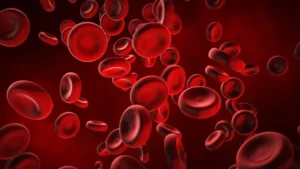Mean Corpuscular Hemoglobin Concentration (MCHC) is a vital measurement in a complete blood count (CBC), assessing the average concentration of hemoglobin in your red blood cells. Understanding MCHC can help pinpoint various health conditions, primarily anemia and other disorders affecting red blood cell integrity. This guide delves deep into why an MCHC blood test is essential, what it measures, and the signs that might prompt you to consider taking one.
Table of Contents
ToggleMCHC Blood Test Levels

MCHC stands for Mean Corpuscular Hemoglobin Concentration, a crucial blood test that measures the concentration of hemoglobin in a given volume of red blood cells. This parameter is an integral part of the red blood cell indices, which also include Mean Corpuscular Volume (MCV) and Mean Corpuscular Hemoglobin (MCH). Here’s what you need to know about MCHC levels:
- Normal Range: Typically, the normal range for MCHC is between 32 to 36 grams per deciliter (g/dL).
- High MCHC Levels: Values above 36 g/dL might indicate hyperchromic anemia, where red blood cells are more concentrated with hemoglobin than normal. Possible causes include spherocytosis or other hereditary disorders.
- Low MCHC Levels: Levels below 32 g/dL suggest hypochromic anemia, often due to iron deficiency, chronic disease, or thalassemia.
Identifying deviations in these levels through an MCHC blood test can be the first step in diagnosing and managing various health conditions.
Symptoms Indicating MCHC Blood Testing

When your MCHC levels are not within the normal range, certain symptoms may prompt the need for an MCHC blood test. Early detection of these symptoms can facilitate prompt diagnosis and treatment.. Here are some of the common symptoms that suggest you might need this test:
Common Symptoms of Low MCHC:
- Fatigue: Feeling unusually tired or weak could indicate low hemoglobin concentration.
- Pale Skin: Less hemoglobin leads to a paler skin tone.
- Shortness of Breath: Difficulty breathing during normal activities.
- Dizziness: Low hemoglobin can cause feelings of lightheadedness.
Signs of High MCHC:
- Jaundice: A yellowing of the skin or whites of the eyes, suggesting red blood cell destruction.
- Dark Urine: Can occur when the body breaks down too many red blood cells.
- Splenomegaly: An enlarged spleen often seen in hemolytic anemia.
Severe Symptoms That Require Immediate Testing:
- Chest Pain
- Fainting Spells
- Severe Weakness
Causes of Abnormal MCHC Blood Test Values
Various factors can influence your MCHC levels, leading to results that are either too high or too low. Understanding these causes can help in identifying the underlying health issues that might be affecting your red blood cells. Here’s a breakdown of potential causes for abnormal MCHC blood test values:
Causes of Low MCHC:
- Iron Deficiency: The most common cause of low MCHC, resulting from inadequate iron in the diet.
- Chronic Diseases: Conditions like inflammatory or autoimmune diseases can affect hemoglobin production.
- Vitamin Deficiencies: Lack of vitamins B12 or folate can lead to reduced hemoglobin concentration.
Causes of High MCHC:
- Hereditary Spherocytosis: A genetic condition causing red blood cells to be sphere-shaped and hemoglobin-rich.
- Liver Disease: Impacts the body’s ability to process and break down hemoglobin properly.
- Autoimmune Hemolytic Anemia: The body attacks its own red blood cells, leading to higher hemoglobin concentration per cell.
Identifying the root causes through a comprehensive assessment, including an MCHC blood test, is crucial for effective treatment planning.
Diagnostic Process for MCHC Blood Test
The diagnostic process for assessing MCHC involves several steps that help determine the cause of abnormal hemoglobin concentration. Here’s how health professionals typically proceed with diagnosing issues based on an MCHC blood test:
Steps in Diagnostic Testing:
- Complete Blood Count (CBC): The MCHC blood test is a part of the CBC, which also measures other components like red blood cells, white blood cells, and platelets.
- Evaluation of RBC Indices: Besides MCHC, tests such as Mean Corpuscular Volume (MCV) and Mean Corpuscular Hemoglobin (MCH) are analyzed to provide a comprehensive view of red blood cell health.
- Review of Symptoms and Medical History: Patient’s symptoms and past health issues are considered to correlate the test results with possible conditions.
Additional Tests:
- Iron Studies: To assess iron levels and storage, crucial for diagnosing iron-deficiency anemia.
- Vitamin B12 and Folate Tests: Necessary for determining deficiencies affecting red blood cell production.
- Bone Marrow Biopsy: In cases where more severe blood disorders are suspected.
These diagnostic tools, starting with the MCHC blood test, allow healthcare providers to accurately identify and address underlying health issues.
Treatment and Management for Abnormal MCHC Blood Test Results

Treating abnormal MCHC values often depends on the underlying cause identified through the MCHC blood test and additional diagnostic assessments. Here are some typical management strategies:
Treatment Options for Low MCHC:
- Iron Supplements: To address iron deficiency anemia.
- Vitamin B12 and Folate Supplements: For anemia caused by nutritional deficiencies.
- Dietary Changes: Increasing intake of iron-rich foods like spinach, red meat, and beans.
Management Strategies for High MCHC:
- Medication: Treating underlying conditions such as liver disease or autoimmune disorders that might cause high MCHC.
- Blood Transfusions: In cases of severe hemolytic anemia.
- Splenectomy: Considered for conditions like hereditary spherocytosis to prevent excessive red blood cell destruction.
Ongoing Monitoring and Support:
- Regular Blood Tests: To monitor MCHC levels and adjust treatment as needed.
- Dietary and Lifestyle Advice: Personalized guidance to support overall blood health.
Prevention and Health Monitoring
Maintaining normal MCHC blood test levels involves proactive health monitoring and preventive measures. Here are strategies to help prevent abnormalities in MCHC levels and ensure overall blood health:
Preventive Measures:
- Nutritional Intake: Consistently consume a balanced diet rich in iron, vitamin B12, and folate.
- Regular Screening: Periodic MCHC blood tests as part of routine health check-ups, especially if you have a history of anemia or other related conditions.
Health Monitoring Tips:
- Watch for Symptoms: Be vigilant about symptoms such as fatigue, paleness, or unusual tiredness, which could indicate changes in MCHC.
- Consult Healthcare Providers: Regular consultations with healthcare providers to discuss any potential health issues and the need for further testing.
Conclusion

The MCHC blood test is a crucial component of the complete blood count (CBC), offering valuable insights into the hemoglobin concentration within your red blood cells. It serves as a fundamental diagnostic tool for identifying and managing various conditions, primarily different forms of anemia. Recognizing the importance of MCHC and understanding when and why it might fluctuate can empower you to take proactive steps towards maintaining your health.
Read Also:
